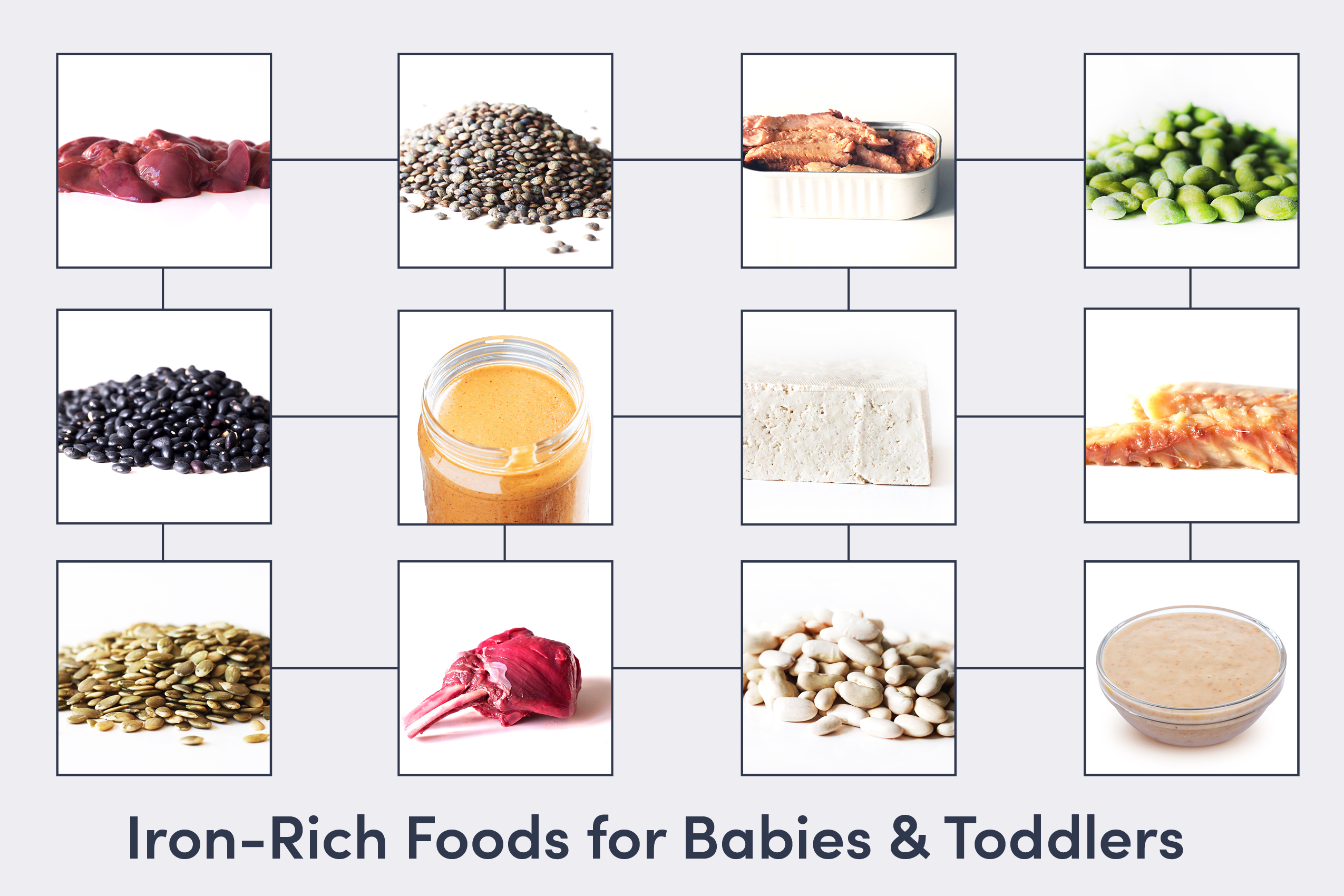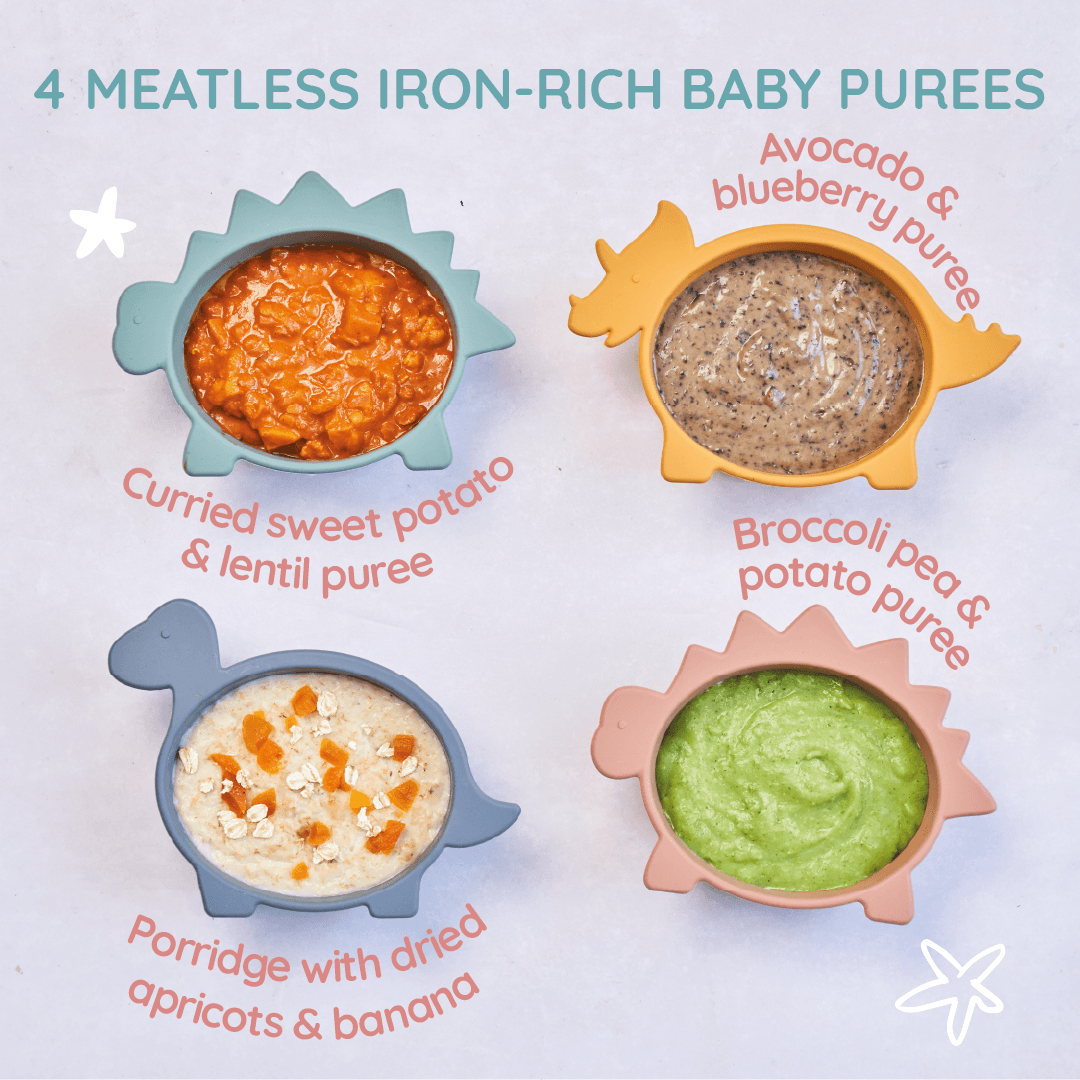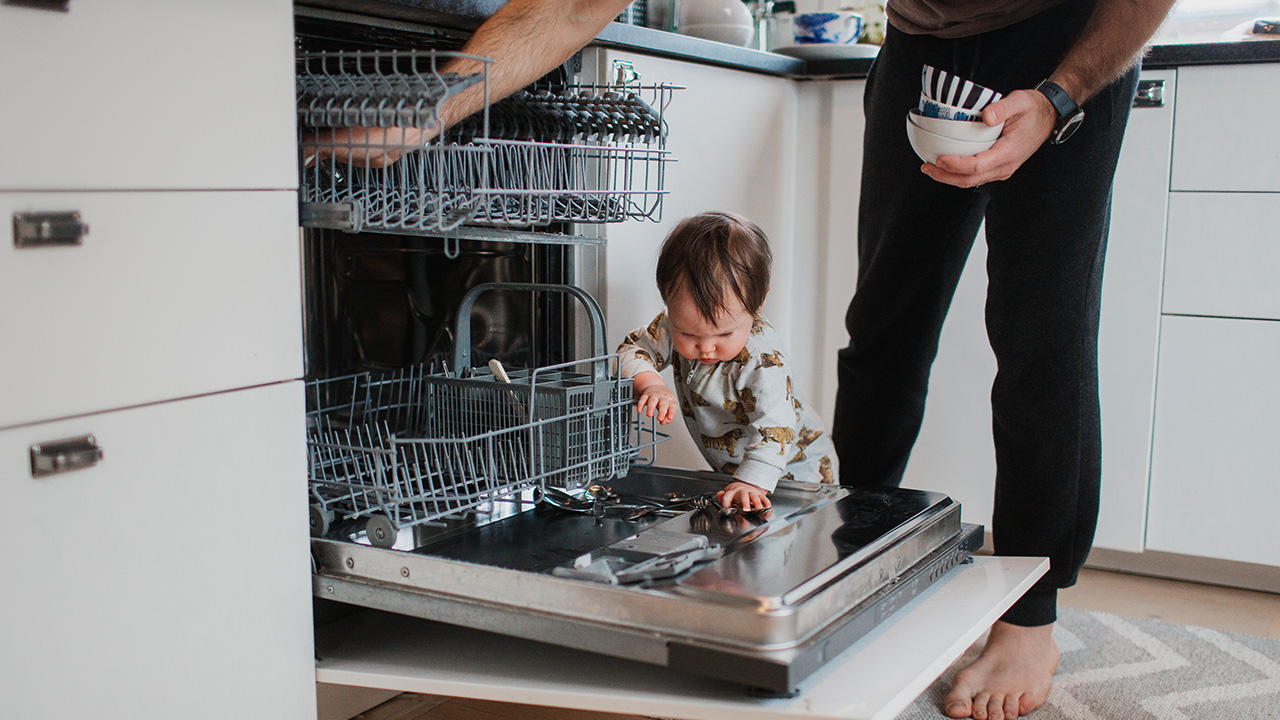Iron Essentials: A Comprehensive Guide on Iron-rich Foods for Babies
Introduction
Babies need proper nourishment for healthy growth and development. Among crucial nutrients, iron stands out for its unique role in the baby's body. This article provides comprehensive insights into iron-rich foods for babies. We delve into the significance of iron, the iron requirements of kids at various stages, and foods high in iron. Furthermore, this guide offers practical tips on incorporating iron-rich foods into your baby's meal plan and enjoyable baby-approved iron-rich recipes.
Why is Iron So Crucial for Babies?
Iron is a major player in the healthy development of babies due to its numerous essential functions:
- Blood Cell Production: Iron is vital in generating healthy blood cells in the body.
- Oxygen Transportation: An important task of iron is delivering oxygen to all parts of an infant's body.

- Physical Growth Aspect: Iron significantly impacts a baby's physical growth, ensuring they are developing at a healthy pace.
- Motor Skills Development: Sufficient iron intake facilitates motor skill advancements in babies.

- Neurological Development: Iron plays a key role in supporting brain functionality and overall neurological progression.
- Immunity Booster: Iron-rich diets are known to enhance babies' immunity, keeping them healthy and protected.
- Cognitive Abilities: A good intake of iron in the diet can significantly enhance a child’s cognitive abilities, thereby fostering learning and development in them.
By understanding iron's importance, parents can prioritize iron-rich foods, ensuring their little ones are getting the crucial nutrient they need. To highlight this, studies have shown that an adequate iron intake correlates positively with an infant's overall health and cognitive development.
What are the General Iron Requirements for Babies at Different Stages?
Babies' need for iron changes as they progress through different stages of development. Ensuring your child receives the appropriate amount of iron is vital for their growth and overall health. Here are the general iron requirements for babies at each key stage:
- Birth to 6 months: During this initial stage, your baby will get enough iron from breast milk or iron-fortified formula. No extra supplements are typically needed at this stage.
- 6-12 months: With the introduction of solid foods, your baby's daily iron requirement increases to approximately 11 milligrams. It is important to introduce iron-rich foods during this crucial period.
- Toddlers (1-3 years): As they continue to grow, their iron requirement slightly decreases to about 7 milligrams a day. Nevertheless, a diet rich in iron should still be maintained.
By understanding these iron requirements, parents can ensure adequate iron intake for their babies, supporting optimal health and development.
What Foods are High in Iron for Babies?
Diversifying your child's diet with high-iron foods is not as challenging as it might seem initially. Numerous baby-friendly options are loaded with iron, catering to both vegetarian and non-vegetarian diets alike.
1. Iron-fortified Cereals: Ideal for your bundle of joy's initial foray into solid foods, these cereals pack a punch in terms of iron content. A single serving can meet 90% of your child's daily iron requirement!
2. Pureed Meats (Chicken and Beef): These pureed meats, loaded with heme iron, are easier for babies to absorb, making them perfect for your child's diet.
3. Beans, Peas, and Lentils: These protein-packed legumes not only satiate hunger effectively but also come packed with iron, providing around 6-8% RDI per half cup.
4. Vegetables (Spinach and Swiss chard): These leafy greens are not only nutrient-dense, but they are also rich in iron, with roughly 2.5-6.4 mg of iron per half cup cooked.
5. Iron-rich Fruits: These include prunes, raisins, apricots, and peaches. Moreover, they are a great way to sweeten your little one's palette while also fulfilling nutritional needs.
6. Whole Grains (Quinoa and Oats): Along with high fiber content, these grains also offer substantial iron content, around 10% RDI per half cup cooked.
7. Seafoods (Shrimp and Fish): Beyond being protein-dense, these marine foods are also loaded with iron.
To further aid in iron absorption, make sure to include vitamin-C-rich fruits like citrus (oranges, melons, strawberries) into your baby's diet. Vitamin C enhances non-heme iron absorption, making it easier for the body to soak up the goodness of iron from these foods.
Thus, there's a diverse platter of high-iron foods you can introduce to your baby's diet. Monitoring their intake allows you to ensure they're getting all the essential nutrients, iron notably, for their happy, healthy growth and development.
How to Effectively Introduce Iron-Rich Foods into Your Baby's Diet?
Iron, being a vital nutrient for your baby's growth, should be introduced into their diet with thoughtful planning. Here's how you can make it a seamless and effective process.
• Start Small and Slow: Begin with a small portion of iron-rich foods. Gradually increase the amount as your baby gets used to it. This strategy gives their digestive system time to adapt and reduces the risk of any adverse reaction.
• Early Introduction: Initiate iron supplementation by combining an iron-fortified cereal with breastfeeding or formula feeding. This marks a gentle and beneficial start to incorporating solid iron-filled foods into your baby's diet.
• Complementary Pureed Foods: As your baby progresses with their acceptance of solid foods, consider pureed meats and blended or mashed vegetables. Choose iron-rich products like chicken, beef, spinach, or Swiss chard. Mix these iron-rich foods with other foods that your baby already enjoys to ensure they relish their meals.
• One At A Time: Adhere to the rule of introducing one new food at a time. Monitor for potential allergic reactions after introducing a new food. Wait a few days before adding another new food to the mix.
• Pair Wisely: Iron absorption in the body is significantly improved when paired with Vitamin C-rich foods. Include fruits such as oranges and strawberries in your baby's diet to boost the intake of iron.
• Meals and Snacks: Don't limit iron-rich foods to main meals. Incorporating them into snacks can add fun and variety to your baby's diet while ensuring they meet their iron needs.
Properly introducing iron-rich foods into your baby's diet is crucial for their healthy growth and development. With a thoughtful, systematic approach, you can successfully meet their iron requirements and set the stage for their wellbeing.
How to Make Iron-Rich Recipes for Babies?
Creating appealing and wholesome recipes rich in iron for babies is an enjoyable and rewarding process when you see them thriving on these nutrient-dense meals. Here's how we can craft some, ensuring they are both delicious and packed with iron:
1. Iron-Boosted Pureed Meats: Starting with baby-friendly meats like chicken or turkey, you can make a puree and incorporate it into your baby's soup or stew. Slow-cooking the meats makes them soft enough to puree and enhances the flavors making it more appealing to your baby.
2. Iron-Power Smoothie: To create this iron-rich smoothie, you'll need raw spinach (high in iron) and bananas (rich in other vital nutrients). Blend both ingredients until smooth, add a little fresh orange juice, known to enhance iron absorption, and serve it at room temperature.
3. Quinoa Porridge with Fruit: A breakfast hit, made by cooking quinoa (an excellent source of iron) into a creamy porridge consistency, then mix in pureed fruits like apricots or peaches for added flavor and vitamins.
4. Lentil Curry with Rice: For older babies who have already been introduced to solids, create a simple lentil curry, as lentils are high in iron. Pair this with rice for a complete nutritional meal.
5. Iron-enriched Pasta with Tomato Sauce: Another great meal option for older babies is iron-enriched pasta. Top it with a homemade tomato sauce, as tomatoes are high in vitamin C, which aids iron absorption.
One key factor to remember while introducing these iron-rich recipes is to start slowly, gauge your baby's reaction, and ensure there's no allergic response.
Incorporating these iron-rich foods in your baby's meals will ensure they get the required intake of iron. Not only are these recipes beneficial, but they're also delicious and will have your baby eagerly awaiting mealtime!
Conclusion
Balancing iron requirement is a pivotal facet of your baby's diet. Understanding the value of iron, knowing the iron-rich food sources, and incorporating them effectively into meals ensures proper growth and development. Follow this guide for optimal iron supplementation in your baby's diet and witness amazing strides in their health and vitality.
Related FAQs about what foods have iron for babies
How can I naturally increase my baby's iron intake?
To naturally increase your baby's iron intake, gradually introduce iron-rich foods like red meats, leafy greens, and beans into their diet. Opt for whole grains or cereals fortified with iron, and pair these with vitamin C-rich foods, such as citrus fruits, to enhance iron absorption. Always consult the pediatrician before implementing dietary changes.
Can too much iron be harmful to babies?
Yes, excessive iron can be harmful to babies, leading to complications like constipation, nausea, and in severe cases, iron toxicity. Therefore, it's important to provide balanced meals with various nutrients and not rely solely on iron-rich foods. In case of supplementation, the recommended dosage by a healthcare provider should be strictly followed.
What are signs of iron deficiency in babies?
Signs of iron deficiency in babies can include fatigue, pale skin, decreased appetite, and slowed growth and development. It might also cause behavioral issues like irritability, and older children might perform poorly in school. Iron deficiency can only be diagnosed through blood tests, so regular check-ups with a pediatrician are essential.


